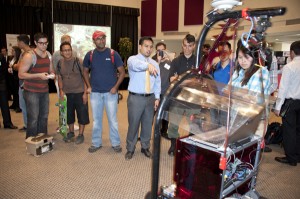CSUN Part of National Initiative to Increase Diversity in STEM

Students at CSUN’s 2013 Senior Design Showcase. Photo by Lee Chool
California State University, Northridge is one of only 20 institutions of higher education across the country selected to take part in a new initiative designed to increase diversity in the fields of science, technology, engineering and mathematics (STEM).
The initiative, Teaching to Increase Diversity and Equity in STEM (TIDES), was announced today by the Association of American Colleges and Universities (AAC&U) as a way of developing models for broad institutional change for the advancement of evidence-based and culturally competent teaching in STEM fields, particularly in the computer and information sciences.
Of the 20 institutions, CSUN was one of 14 selected as a “full awardee,” meaning it can receive up to $300,000 for faculty and curriculum development over the next three years. The TIDES initiative is funded with a $4.9 million grant from The Leona M. and Harry B. Helmsley Charitable Trust.
“We are very concerned about what we can do to attract students, especially women and individuals from underrepresented communities, excited about STEM, and in particular computer and information sciences,” said S.K. Ramesh, dean of CSUN’s College of Engineering and Computer Science. “Our project aims to utilize music as a way to attract students to STEM disciplines and make it more accessible.”
The college is already home to a successful U.S. Department of Education Hispanic Serving Institution STEM grant that supports Hispanic and economically disadvantaged students in graduating with degrees in engineering and computer science.
“The AAC&U grant further exemplifies the college’s commitment to diversity and to attract and graduate underrepresented minorities in our programs,” Ramesh said.
CSUN computer science professors Ani Nahapetian and Gloria Melara are working with music professor Ric Alviso to develop courses that use music, particularly world music, as a way of encouraging women and persons from underrepresented communities to consider careers in computer or information sciences. The goal is not only to find ways to attract more people into careers in STEM fields, but also to develop culturally sensitive pedagogies that demonstrate a successful track record.
“By re-imagining the introductory programming course materials and infusing topics from world music, we are striving to communicate to our students the exciting and vibrant nature of our often misunderstood field,” Nahapetian said. “As an applied field, computer programs are developed to address a need in an application area. Typically, the application areas presented in lectures and assigned for homework carried little cultural relevance to students. We, instead, are using musical genres such as salsa, blues and hip-hop to inspire lecture examples, programming projects and lab modules that reference musical topics such as rhythm, scales and tones across cultures.
“By programming instruction to better reflect the array of applications capturing the nation’s imagination, we can attract, retain and support all students, including many from underrepresented groups,” she said.
In addition to CSUN, the other TIDES full awardees include Bryn Mawr College in Pennsylvania, Farleigh Dickinson University in New Jersey, Fayetteville State University in North Carolina, Howard University in Washington, D.C., Lawrence Tech University in Michigan, Montgomery College in Maryland, Morgan State University in Maryland, Salish Kootenai College in Montana, Smith College in Massachusetts, University of Dayton in Ohio, University of Puerto Rico-Humacao, Westminster College in Utah and Wright State University in Ohio.
Receiving honorable mention were Connecticut College, Knox College in Illinois, Ohio Northern University, Pitzer College and Queens College in New York. The University of Wisconsin-Whitewater received a noteworthy designation.
The 20 TIDES schools were selected via a two-tier, peer-review process that included reviewers from a range of disciplines, both STEM and non-STEM. The reviewers based their selections on the following criteria: a high level of institutional readiness; a demonstrated commitment to sustaining the project’s activities; a targeted focus on increasing the number of women and underrepresented minorities in the undergraduate computer/information science disciplines; and innovation in linking computer/information sciences with other STEM and non-STEM courses.
“It is critically important for higher education to find ways to increase success in STEM fields for both women and all students from underserved communities,” said AAC&U President Carol Geary Schneider. “AAC&U is honored to have this opportunity to build on its history of commitment to equity and excellence through the TIDES initiative.”
AAC&U is the leading national association concerned with the quality, vitality and public standing of undergraduate liberal education. Its members are committed to extending the advantages of a liberal education to all students, regardless of academic specialization or intended career. Founded in 1915, AAC&U now comprises more than 1,300 member institutions — including accredited public and private colleges, community colleges, research universities and comprehensive universities of every type and size.
California State University, Northridge has more than 38,000 full- and part-time students and offers 63 bachelor’s and 53 master’s degrees as well as 28 teaching credential programs. Founded in 1958, CSUN is among the largest single-campus universities in the nation and the only four-year public university in the San Fernando Valley. The university is home to dozens of nationally recognized programs where students gain valuable hands-on experience working alongside faculty and industry professionals, whether in the sciences, health care and engineering or education, political science, the arts and the social sciences. While regionally focused, the university’s faculty and administrators recognize the important role its students and alumni play in shaping the future of the state and the nation.

 experience
experience